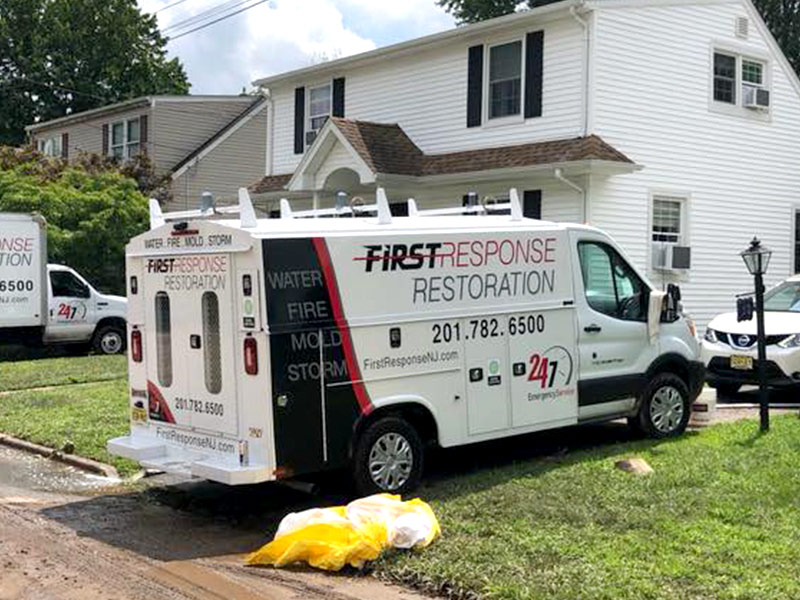The FAQs of Water Damage and Water Damage Restoration
Water damage can be a devastating event for any property owner, disrupting their daily lives and causing serious financial stress. When dealing with such an event, many questions come up about the causes, effects, and restoration processes involved. In order to better equip property owners with the knowledge they need about water damage and water damage restoration, we’ve put together a list of frequently asked questions (FAQs) and our expert insights and advice.
What is Water Damage?
Water damage refers to any destruction or adverse effect caused by water invading where it shouldn’t be. It can result from various sources, including natural disasters (such as floods and hurricanes), plumbing failures, or malfunctioning household appliances. The severity of water damage can vary from minor inconveniences to extensive structural damage, requiring professional assistance.
How Does Water Damage Occur?
Water damage can occur due to several reasons, categorized broadly into natural and man-made causes.
- Natural Causes:
– Flooding
– Ice Dams
– Groundwater Seepage Can occur due to high water tables or poor property grading.
– Storms, Blizzards, and other weather related events - Man-Made Causes:
– Burst Pipes
– Leaky Roofs
– Faulty Appliances
– Sewage Backups
– Household Mishaps
What are the Categories of Water Damage?
Water damage is classified into three categories based on the level of contamination involved:
- Category 1 (Clean Water) – Originates from a clean source such as a broken water supply line or leaking faucet. This water poses no substantial risk to your health if you treat it right away.
- Category 2 (Gray Water) – Contains significant levels of contaminants and can cause discomfort or illness if ingested. Examples include water from washing machines, dishwashers, or toilet overflow without waste.
- Category 3 (Black Water) – Highly contaminated and can cause serious health issues. This category includes water from sewage backups, flooding from rivers, or standing water that has been stagnant for days.
What Immediate Actions Should Be Taken after Water Damage?
Water damage can be mitigated if you act fast. Here’s what First Response Restoration recommends:
- Safety First
– Turn off electricity to prevent harm, so long as it is safe to do so.
– Avoid contaminated water, especially if it poses health risks.
– Evacuate if the property is unsafe. - Stop the Water Source
– If possible, identify and stop the source of water intrusion.
- Contact Professionals
– Contact a water damage restoration company like First Response Restoration to begin the remediation process. - Document the Damage
– Take photos and videos of the affected areas for insurance claims.
Why is it Important to Contact a Professional Restoration Company?
Water damage often extends beyond what the eyes can see. Professional restoration companies have the expertise and equipment to effectively address both visible and hidden damages. Without a professional ouch, you run the risk of improperly restoring the damage, which can lead to mold growth and extensive damage down the line.
What is the Water Damage Restoration Process?
At First Response Restoration, we follow a meticulous process designed to thoroughly restore your property. Here’s a typical restoration process:
Inspection and Assessment
Using advanced moisture detection instruments, we thoroughly inspect the property to determine the damage’s extent and a customized plan of action.
Water Removal/Extraction
Powerful pumps and vacuums are deployed to remove standing water.
Drying and Dehumidification
After water extraction, industrial-grade dehumidifiers and air movers are set up to dry out the remaining moisture.
Cleaning and Sanitizing
Cleaning and sanitizing of the damaged areas follow, which may include antimicrobial treatments to prevent mold and mildew growth.
Restoration
Restoration involves minor repairs like drywall replacement or significant reconstruction and remodeling tasks if necessary.
How Can Mold Growth be Prevented?
Mold growth can begin within 24-48 hours after water damage. The following methods are recommended by First Response Restoration for prevention:
Immediate Response
To stop mold growth, you need to remove water quickly and dry out the affected area and materials.
Proper Ventilation
Ensure good airflow and use dehumidifiers to reduce indoor humidity levels.
Sanitize and Disinfect
Use antimicrobial solutions on affected areas.
Trust a Professional
When you work with a professional, you will have access to someone who knows how to prevent or treat mold after water damage.
Is Water Damage Covered by Home Insurance?
Insurance coverage for water damage depends on the policy and the cause of the damage. Generally, standard homeowner policies cover sudden and accidental damage like burst pipes but exclude gradual damage like roof leaks. Flood damage usually requires a separate flood insurance policy. First Response Restoration advises property owners to review their insurance policies and consult with their providers for specific coverage details.
How Can Water Damage Be Prevented?
Preventive measures can significantly reduce the risk of future water damage. First Response Restoration recommends:
Regular Maintenance
Maintain plumbing and appliances to prevent sudden failures.
Property Grading
Ensure proper grading around the property to direct water away.
Gutters and Downspouts
Keep them clean and in good condition to facilitate proper water drainage.
Sump Pumps
Install and maintain sump pumps in basements to prevent groundwater intrusion.
Sealing and Insulating
Seal cracks in walls, floors, and foundations, and insulate pipes to prevent freezing.
Water damage has a lot of challenges, from immediate damage control to long-term restoration and prevention. First Response Restoration is committed to providing comprehensive support, addressing all aspects of water damage and restoration. With a blend of expertise, advanced technology, and a customer-centric approach, we aim to restore not just properties but peace of mind for homeowners facing water damage.
With all the questions we’ve answered about water damage and restoration, it’s clear that understanding the intricate details is key. Having the right knowledge is the key to dealing with water damage confidently and getting professional help is essential for an effective and efficient restoration.
To stop water damage, be vigilant, take action quickly, and get professional help. Whether it’s through thorough maintenance, immediate disaster response, or meticulous restoration, First Response Restoration stands ready to assist every step of the way, ensuring the safety, integrity, and resilience of your property.
Got water damage? Contact our experts today!




